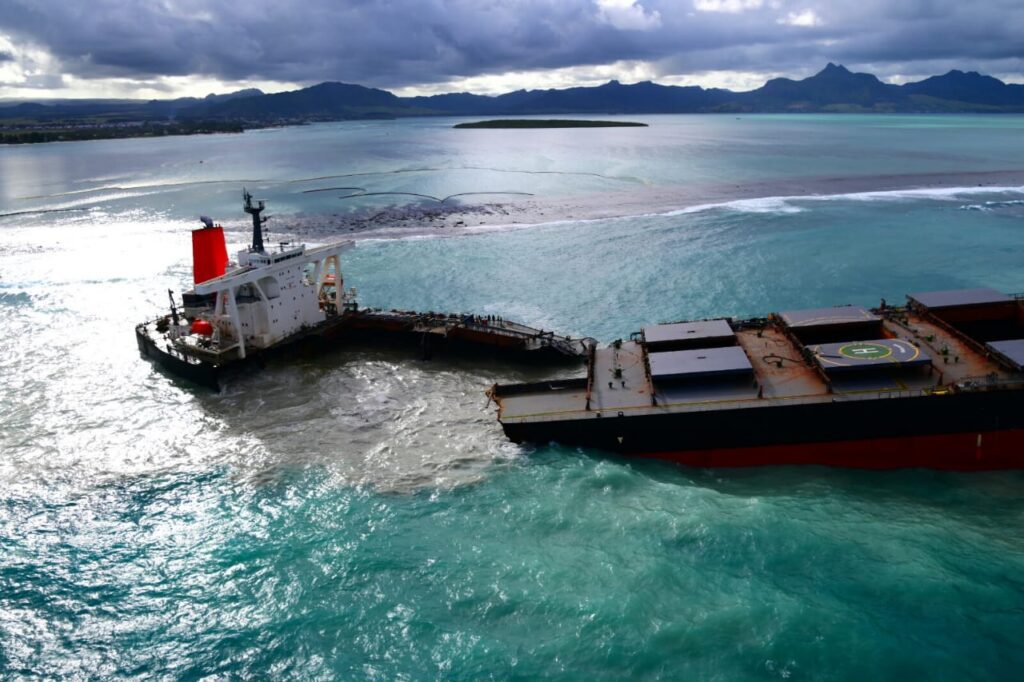Marine transport is the backbone of the global economy. Since it is the most efficient form of transporting goods, shipping has been substantially expanding.
It is estimated that today more than 100,000 merchant vessels sail around the world oceans. Ships have become bigger and bigger. The largest of these ocean giants carry more than 24,000 containers, 7500 cars, or 800 billion liters of crude oil, and are up to 400 meters long and 60 meters wide – 4,5 football fields in size.

What are the risks?
Shipping is a dangerous and often dirty business and in consequence the risks to marine ecosystems and coastal economies are substantial. Accidents, minor and major, cause marine pollution and damage to marine eco-systems.
In 2022 more than 3,000 incident were reported, almost 40 ships lost at sea, and seven accidents of oil tankers, let to a spillage of 15,000 tons of oil. On average each year more than 1,500 containers are lost at sea, and ship strikes kill more than 20,000 whales. Growing noise pollution from shipping disrupts marine eco-systems. With the ongoing expansion of shipping and the extreme weather and higher waves implied by climate change, these risks become even more concerning.

Addressing the threats and mitigating these risks require an integrated response that considers marine safety, maritime security and environmental protection.
Finding solutions
SafeSeas researchers have studied a range of specific incidents and the political consequences they entail. Our goal is to raise awareness for these risks and investigate the role of maritime security in addressing them.
Identifying how these forms of infrastructure harms intersect with blue crimes, and how maritime law enforcement and maritime domain awareness can contribute to prevention and responses, are key questions. Other dynamics, for instance, the rise of so-called ‘dark fleets’ with weak compliance, and the role of international sanctions in increasing shipping risks also requires attention.
Investigating major incidents
In 2020 we have investigated in particular the explosion in the port of Beirut and the major oil spill that occurred in Mauritius when the Wakashio grounded close to shore. Both are crucial crisis moments that have caught global attention. While different in character, the incidents showcase how smaller non-compliance with regulations can lead up to and cause major emergencies.
Marking the three year anniversary of the Wakashio incident in August 2023 we held an event in Mauritius in partnership with the Charles Telfair Centre and the University of Copenhagen reviewing the lessons and discussing solutions for addressing shipping risks in small island states.
Dark fleets and sanctions
The rise of sanctions in the maritime industry has increased shipping risks such as oil spills significantly. Excluded from legitimate shipping markets, countries such as Russia, Iran, and Venezuela rely on so-called dark or shadow tankers for their oil exports.
These are aging and substandard vessels that are registered through anonymous offshore shell companies and that often don’t have adequate safety and insurance certificates. Hundreds of these tankers – up to 10 percent of the global oil trading fleet – currently carry sanctioned oil around the world, causing accidents and oil spills that threaten the marine environment.
Research Activities and Outputs
Since March 2022 our research work in this area benefits from a grant by the Velux Foundation as part of the Ocean Infrastructures Research Group (OCINFRA) at the University of Copenhagen.
Find out more in our articles and outputs:
- Southeast Asian States Need to Tackle the Dangerous Shadow Tanker Activities in Their Waters. The Diplomat, September, 14, 2023.
- Missed opportunities? Enhancing maritime safety through the EU’s 2023 maritime package. SafeSeas, August 25, 2023.
- The threat from Russia’s fleet of ‘ghost tankers’. EU Observer, April 13, 2023.
- Russia’s using ‘dark’ tankers to evade Western oil sanctions. Washington Post/ Monkey Cage, December 8.
- The West wants to cut off Russia’s oil revenues. Who will that hurt? Washington Post/ Monkey Cage, October 21.
- Green Shipping Must Go Beyond Decarbonization, Maritime Executive, 10.12.2021.
- Mauritius oil spill reveals weakness of maritime security architecture in the Western Indian Ocean, Observer Research Foundation, 3.9.2020.
- Lessons for Africa from devastating Mauritius oil spill, ISS Today, 17.8.2020.
- Mauritius oil spill: Was the government unprepared?, SafeSeas Commentary, 14.8.2020,
- The Mauritius Disaster: Overlooked Dimensions of Maritime Security, The Diplomat, 13.8.2020,
- The Beirut Disaster Is a Wake-up Call for Southeast Asia, The Diplomat, 7.8.2020.
- African ports need to learn the lessons from Beirut, African Business Magazine, 6.8.2020.
- Beirut explosion: the disaster was exceptional but events leading up to it were not – researchers, The Conversation (UK), 5.8.2020.
